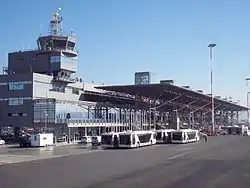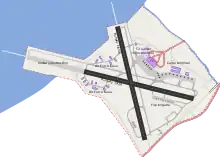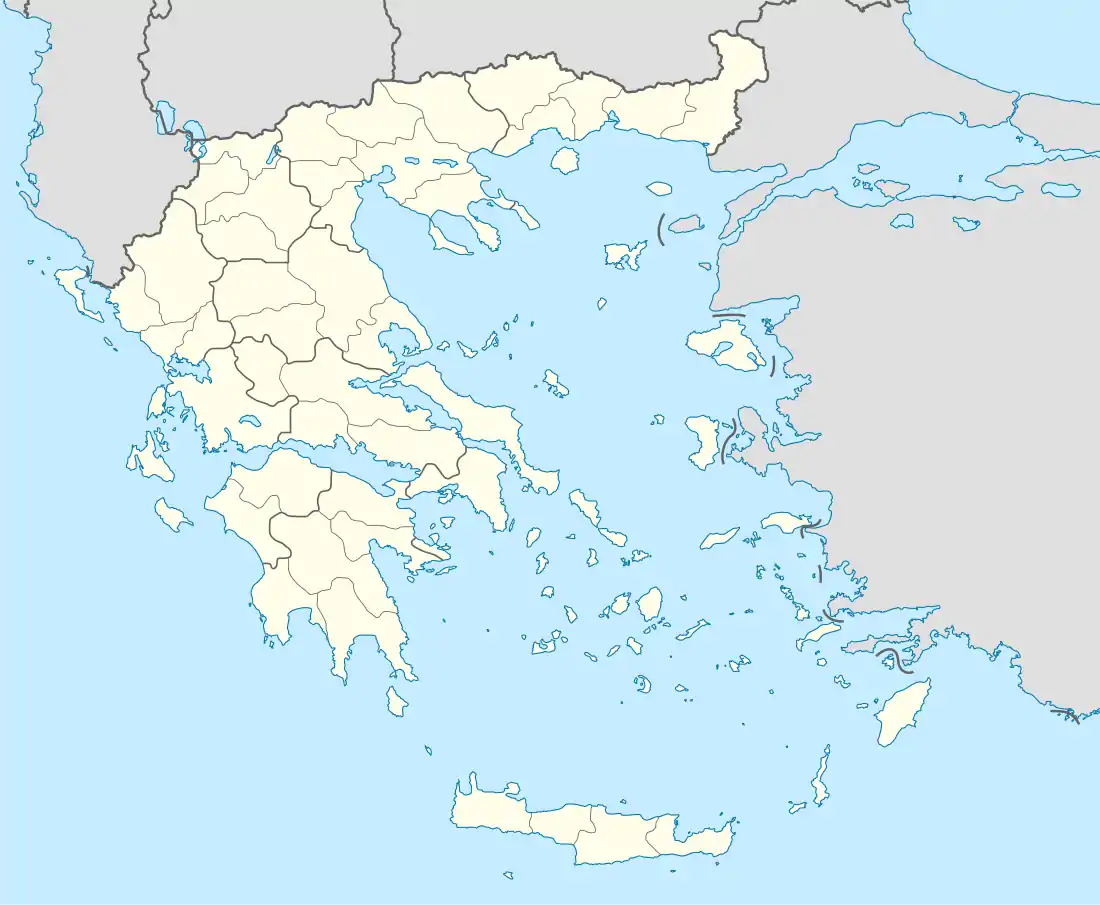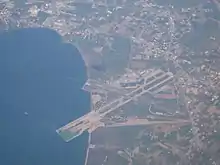Thessaloniki Airport
Thessaloniki Airport (IATA: SKG, ICAO: LGTS), officially Thessaloniki Airport "Makedonia"[4] (Greek: Κρατικός Αερολιμένας Θεσσαλονίκης "Μακεδονία", romanized: Kratikós Aeroliménas Thessaloníkis "Makedonía")[5] and formerly Mikra Airport, is an international airport serving Thessaloniki, the second-largest city in Greece. It is located 13 km (8.1 mi) southeast of the city, in Thermi.[1]
Thessaloniki Airport "Makedonia" Κρατικός Αερολιμένας Θεσσαλονίκης "Μακεδονία" | |||||||||||||||
|---|---|---|---|---|---|---|---|---|---|---|---|---|---|---|---|
 | |||||||||||||||
 | |||||||||||||||
| Summary | |||||||||||||||
| Airport type | Public / military | ||||||||||||||
| Owner | Government of Greece | ||||||||||||||
| Operator | Fraport Greece | ||||||||||||||
| Serves | Thessaloniki | ||||||||||||||
| Location | Mikra, Macedonia, Greece | ||||||||||||||
| Hub for | |||||||||||||||
| Elevation AMSL | 7 m / 22 ft | ||||||||||||||
| Coordinates | 40°31′11″N 22°58′15″E | ||||||||||||||
| Website | skg-airport.gr Official airfield data at the Air Traffic Safety Electronic Engineers Association of Hellenic Civil Aviation Authority website lists no official website for the airport. | ||||||||||||||
| Maps | |||||||||||||||
 Map of the airport | |||||||||||||||
 SKG Location of the airport in Greece | |||||||||||||||
| Runways | |||||||||||||||
| |||||||||||||||
| Statistics (2019) | |||||||||||||||
| |||||||||||||||
The airport is the third-largest airport in the country after Athens International Airport and Heraklion International Airport. It opened in 1930 and was the second-busiest airport in Greece in terms of flights served and the third-busiest in terms of passengers served in 2016, with over 6 million passengers. It is the main airport of Northern Greece and apart from the city of Thessaloniki it also serves the popular tourist destination of Chalkidiki and the surrounding cities of Central Macedonia. The Athens–Thessaloniki route is the tenth busiest in the EU with 1.8 million passengers.[6] To cope with demand, a second terminal is currently under construction as part of a billion-euro investment by Fraport Greece, the company which operates the airport.[7][8]
History
The airport was first established as an airfield during the First World War, as part of the allied war effort on the Macedonian front.[9] There were numerous airfields at the time, including Little Mikra, Big Mikra (which became the current international airport), and the major military airfield of Sedes.[9] The first international flight to Thessaloniki landed at the Little Mikra air field, and government efforts at encouraging the growth of civil aviation saw the start of construction of a purpose-built civilian airport at the present location in 1938.[9] Works were temporarily abandoned due to the Second World War and the airport opened to civilian traffic in 1948.[9]
Major works were undertaken after the war. The accession of Greece to North Atlantic Treaty Organisation saw NATO-funded investments such as the expansion of the 10/28 runway to 2,440 metres (8,010 ft) and the inauguration of a new terminal building in 1965.[9] Damage to the tower caused by the 1978 Thessaloniki earthquake meant it needed to be torn down, and a new tower, still in operation, was built.[9] Modernisation works were undertaken in the late 1990s, as part of the celebrations for Thessaloniki being European Capital of Culture in 1997.[9] In 1993 the airport took the name Makedonia (Greek: Μακεδονία, Macedonia).[9]
The operational aspects of the airport were privatised in 2015. Fraport AG/Copelouzos Group joint venture and the state privatisation fund agreed to the privatisation of the airport operations, and 13 other Greek airports, in December 2015.[10] Fraport Greece will operate the airport for 40 years starting on 11 April 2017.[11] It pledged to invest €400 million ($451.88 million) on the various airports, including a refurbishment of the existing terminal at Thessaloniki as well as the construction of a second terminal.[12] Construction on the new terminal began on 19 September 2018.[7] Fraport expects passenger traffic to increase by 48% by 2026 as a result of its investment.[9]
Facilities
Terminal
The airport's terminal consists of three floors. The ground floor serves arrivals only and is divided into two sections: international/extra-Schengen arrivals and domestic/intra-Schengen arrivals. The second floor serves departures and also includes a shopping center. On this floor there are 34 check-in counters, waiting areas, bars, stores and various airlines' offices. The third floor houses two restaurants and several bars with views to the runways. There are two passenger lounges. An additional terminal is to be opened in 2021.[13]
Runways and apron

The airport has two runways (10/28 and 16/34) and two taxiways. There are 22 stands for narrow-body aircraft and about 20 for light aircraft.
A modernisation and expansion project for runway 10/28 began in 2005, with an initial completion date of 2011, but has since been delayed[13] and was finally completed in March 2019.[14] Modernisation projects on the tarmac and other runway are expected to be completed in 2019.[13] The runway entered service on 11 September 2020.[15] Overall, the project took almost a quarter century to build, from inception in 1997, and it has an estimated cost of €179 million ($202 million).[16] The runway will be extended by 1000 meters into the sea, with a total length of 3440 meters and will be equipped with ILS.[14] When the runway opens for commercial use it will be able to accommodate 89.6% of current commercial aircraft types, as opposed to just 22.6% before the extension,[16] and will improve safety while landing in bad weather conditions and low visibility.[14]
Airlines and destinations
Statistics
Overview
Between 1994 and 2010, Thessaloniki Airport saw a rise in passenger traffic equal to 76%, from 2.2 million in 1994 to 3.9 million in 2010.[4] Between 2003 and 2008 the airport saw a passenger traffic increase of 19.1% from 3.5 million to almost 4.2 million passengers, an all-time high. The number of passengers dropped in next years. However, over the last two years the airport experienced passenger traffic increase to just above four million by 2013. Significant traffic increase took place during 2014, with the total number of passengers exceeding the five million mark for the first time.[4]
Annual statistics
| Year | Passenger traffic |
Passenger % change |
Aircraft movements |
Aircraft % change |
|---|---|---|---|---|
| 1994 | 2,227,487 | n/a | 29.990 | n/a |
| 1995 | 2,336,219 | 4.8 | 30.827 | 2.7 |
| 1996 | 2,499,892 | 7 | 33.850 | 9.8 |
| 1997 | 2,797,166 | 11.8 | 39.766 | 17.4 |
| 1998 | 2,667,075 | 4.6 | 39.473 | n/a |
| 1999 | 3,186,721 | 19.4 | 47.589 | n/a |
| 2000 | 3,548,027 | 11.3 | 49.007 | n/a |
| 2001 | 3,430,819 | 3.3 | 42.982 | n/a |
| 2002 | 3,257,436 | 5 | 39.550 | n/a |
| 2003 | 3,500,922 | 7.4 | 48.310 | n/a |
| 2004 | 3,620,909 | 3.4 | 50.608 | n/a |
| 2005 | 3,670,581 | 3.6 | 47.186 | n/a |
| 2006 | 3,802,854 | 5.6 | 47.380 | n/a |
| 2007 | 4,167,969 | 9.7 | 50.244 | n/a |
| 2008 | 4,169,559 | 0.4 | 47.882 | n/a |
| 2009 | 4,104,195 | 1.5 | 50.238 | n/a |
| 2010 | 3,910,751 | 4.7 | 44,938 | n/a |
| 2011 | 3,958,475 | 1.2 | 43,430 | 3.3 |
| 2012 | 4,006,204 | 1.2 | 43,006 | 0.9 |
| 2013 | 4,039,576 | 0.8 | 39,500 | 8.6 |
| 2014 | 4,950,726 | 22.5 | 45,900 | 16.2 |
| 2015 | 5,341,293 | 7.8 | 47,340 | 3.1 |
| 2016 | 5,735,581 | 7.3 | 48,710 | 2.8 |
| 2017 | 6,247,514 | 8.9 | 54,931 | 12.7 |
| 2018 | 6,689,193 | 7 | 55,307 | 0.6 |
| 2019 | 6,897,057 | 3,1 | 55,738 | 0.9 |
| 2020 | 2.317.336 | 66,4 | 24.966 | 55.2 |
Busiest passenger routes by country
The table below shows passenger totals at Thessaloniki International Airport by country destination during 2018. [25]
| Rank | Country destination | Passengers | Change % |
|---|---|---|---|
| GR | Greece | 2,333,925 | 0.8 |
| 1 | Germany | 1.488.151 | 8.9 |
| 2 | Great Britain | 444,284 | 22.5 |
| 3 | Cyprus | 432,856 | 2.5 |
| 4 | Russia | 337,676 | 4.3 |
| 5 | Italy | 235,204 | 17.6 |
| 6 | The Netherlands | 163.850 | 55.3 |
| 7 | Turkey | 131,925 | 2.3 |
| 8 | Israel | 124,232 | 124.2 |
| 9 | Poland | 118,533 | 8.9 |
| 10 | Belgium | 111,860 | 9.4 |
Busiest routes
| Rank | Destination | Airport | Monthly one-way capacity 2016 |
Airline(s) |
|---|---|---|---|---|
| 1 | ATH | 65,298 | Aegean Airlines, Sky Express | |
| 2 | MUC | 16,678 | Aegean Airlines, Lufthansa | |
| 3 | STR | 11,490 | Aegean Airlines, Eurowings | |
| 4 | SXF | 10,710 | Aegean Airlines, easyJet, Ryanair | |
| 5 | LCA | 9,826 | Aegean Airlines, Wizz Air | |
| 6 | HER | 9,798 | Aegean Airlines, Ellinair, Ryanair, Sky Express, Volotea | |
| 7 | IST | 9,060 | Turkish Airlines | |
| 8 | PFO | 8,883 | Ryanair | |
| 9 | DUS | 8,859 | Aegean Airlines, Eurowings | |
| 10 | CHQ | 8,802 | Aegean Airlines, Ryanair | |
| 11 | FRA | 8,406 | Aegean Airlines, Condor, Lufthansa | |
| 12 | LGW | 8,304 | British Airways, easyJet, TUI Airways |
Top airlines
| Rank | Airline | Passengers | Change |
|---|---|---|---|
| 1 | 105,348 | ||
| 2 | 75,789 | ||
| 3 | 15,888 | ||
| 4 | 15,408 | ||
| 5 | 11,760 | ||
| 6 | 10,578 | ||
| 7 | 10,062 | N/A | |
| 8 | 9,060 | ||
| 9 | 5,820 | ||
| 10 | 5,670 | ||
| 11 | 5,284 | ||
| 12 | 5,220 |
Transport
OASTH Bus 01X | |||||||||||||||||||||||||||||||||||||||||||||||||||||||||||||||||||||||||||||||||||||||||||||||||||||||||||||||||||||||||||||||||||||||||||||||||||||||||||||||||||||||||||||||||||||||||||||||||||||||||||
|---|---|---|---|---|---|---|---|---|---|---|---|---|---|---|---|---|---|---|---|---|---|---|---|---|---|---|---|---|---|---|---|---|---|---|---|---|---|---|---|---|---|---|---|---|---|---|---|---|---|---|---|---|---|---|---|---|---|---|---|---|---|---|---|---|---|---|---|---|---|---|---|---|---|---|---|---|---|---|---|---|---|---|---|---|---|---|---|---|---|---|---|---|---|---|---|---|---|---|---|---|---|---|---|---|---|---|---|---|---|---|---|---|---|---|---|---|---|---|---|---|---|---|---|---|---|---|---|---|---|---|---|---|---|---|---|---|---|---|---|---|---|---|---|---|---|---|---|---|---|---|---|---|---|---|---|---|---|---|---|---|---|---|---|---|---|---|---|---|---|---|---|---|---|---|---|---|---|---|---|---|---|---|---|---|---|---|---|---|---|---|---|---|---|---|---|---|---|---|---|---|---|---|---|
KTEL–Makedonia Airport | |||||||||||||||||||||||||||||||||||||||||||||||||||||||||||||||||||||||||||||||||||||||||||||||||||||||||||||||||||||||||||||||||||||||||||||||||||||||||||||||||||||||||||||||||||||||||||||||||||||||||||
| |||||||||||||||||||||||||||||||||||||||||||||||||||||||||||||||||||||||||||||||||||||||||||||||||||||||||||||||||||||||||||||||||||||||||||||||||||||||||||||||||||||||||||||||||||||||||||||||||||||||||||
The airport is directly connected with the city's major road arteries in the southeast, the EO16 and the A25, which connects Thessaloniki with Chalkidiki, via the ΕΟ67. The Thessaloniki Inner Ring Road provides access to the A1/E75 and A2/E90 motorways. A total of 2,285 parking spaces for cars exist at the front of the terminal building. A car rental service is available at the terminal building. In addition, taxi services are available outside the airport terminal building 24 hours a day.[27]
Public transport
There are plans to connect the airport with the Thessaloniki Metro network, which is set to open in 2023 after delays. Attiko Metro, the company overseeing the project, has published a map of proposed extensions, and it includes an overground extension of Line 2 towards the airport.[28] This extension is not an immediate concern for the company, however, since the terminus of Line 2, Mikra, will be connected with the airport by a 10-minute shuttle bus.[29] Detailed planning of the metro extension toward the airport was initiated in March 2019.[30]
In the meantime, the airport is served on a 24-hour basis by bus 01X/01N of the Thessaloniki Urban Transport Organization (OASTH), which provides bus services between the Thessaloniki Bus Station (KTEL) and Makedonia airport arrivals/departures.[31]
Accidents and incidents
.jpg.webp)
- On 12 August 1997, Olympic Airways Flight 171, a Boeing 727-230 registered as SX-CBI inbound from Athens Ellinikon Airport, touched down late and was steered off the runway to avoid overrunning into the sea. None of the 35 passengers and crew were killed, but the aircraft was damaged beyond repair.[32]
- On 17 December 1997, Aerosvit Flight 241, a Yakovlev Yak-42, operating the route from Odessa, Ukraine to Thessaloniki, lost contact with the airport's air traffic control and during the second attempt the aircraft crashed in the Pierian Mountains, near Mount Olympus. A total of 70 people, passengers and crew, 41 of which were Greeks, were killed.
- On 4 July 2000, HA-LCR, a chartered Malév Flight 262 Tupolev Tu-154 landed on its belly. The crew had forgotten to lower the undercarriage and the plane skidded 400 m (1,300 ft) on the runway. Thanks to the plane's robust construction and the engines' high position, the plane was able to become airborne again as the pilots applied full throttle. It circled while the crew lowered the undercarriage and landed safely. There were no injuries. It was considered uneconomical to repair the aircraft. The aircraft still remains on site,[33] although airline markings have been obscured and it has been heavily depleted of re-usable spares.
- On 15 June 2013, an AMC Airlines Boeing 737-800 on behalf of Astra Airlines Greece, registration SU-BPZ performing flight A2-921 from Novosibirsk (Russia) to Thessaloniki (Greece) with 160 passengers, landed on Thessaloniki's runway 16 at about 07:14L (04:14Z) but overran the end of the runway by about 110 meters/360 feet and came to a stop with all gear on soft ground. No injuries occurred, the aircraft received minor if any damage.[34]
References
- "EAD Basic". Ead.eurocontrol.int. Retrieved 12 July 2015.
- "MAKEDONIA". World Aero Data. WorldAeroData.com. Retrieved 2 March 2020.
- "Thessaloniki Airport Air Traffic statistics". Retrieved 10 January 2020.
- "THESSALONIKI AIRPORT "MAKEDONIA"". Retrieved 24 January 2018.
- "Κρατικός Αερολιμένας Θεσσαλονίκης "Μακεδονία" (ΚΑΘΜ)". Retrieved 24 January 2018.
- "International intra-EU air passenger transport by reporting country and EU partner country". www.eurostat.ec.europa.eu. Eurostat. 2016. Retrieved 26 September 2018.
- Zois, Fanis (19 September 2018). "Θεμελιώνεται το νέο τέρμιναλ του αεροδρομίου "Μακεδονία"" [Foundation works begin on the new terminal of Makedonia airport]. www.naftemporiki.gr (in Greek). Naftemporiki. Retrieved 26 September 2018.
- "Thessaloniki". www.fraport-greece.com. Fraport Greece. Retrieved 26 September 2018.
- Τζήμου, Κύα (19 October 2016). "Από τη Μίκρα στο SKG. Από το χθες στο αύριο του αεροδρομίου της Θεσσαλονίκης" [From Mikra to SKG: From the yesterday to the tomorrow of Thessaloniki airport]. www.parallaximag.gr (in Greek). Parallaxi Magazine. Retrieved 26 September 2018.
- "Greece signs privatization of 14 regional airports with Germany's Fraport - TornosNews.gr". www.tornosnews.gr.
- "The Company". www.fraport-greece.com. Retrieved 26 September 2018.
- "The Future of the "MAKEDONIA" airport". www.skg-airport.gr. Retrieved 26 September 2018.
- "Αεροδρόμιο Μακεδονία: Το 2019 μεταφέρεται η λειτουργία του νέου "υπερατλαντικού" διαδρόμου" [Makedonia Airport: the operation of the new "transcontinental" runway is being pushed back to 2019]. www.ypodomes.gr. Retrieved 24 February 2018.
- "Παραδόθηκε ο "υπερατλαντικός" διάδρομος προσαπογείωσης 10-28 του Αεροδρομίου Μακεδονία - ypodomes.com". www.ypodomes.com (in Greek). Retrieved 7 April 2019.
- Τασούλα, Αρετή. "ΝΕΑ ΕΠΟΧΗ ΣΤΟ "ΜΑΚΕΔΟΝΙΑ"-Η ΠΡΩΤΗ ΠΡΟΣΓΕΙΩΣΗ ΣΤΟΝ ΔΙΑΔΡΟΜΟ 10/28 (VID)". Voria. Retrieved 15 September 2020.
- Καρολίδου, Άννη (16 April 2018). ""Μακεδονία": Οδύσσεια 21 ετών για τον διάδρομο 10-28 – Πότε τελειώνει" ["Makedonia": 21-year Odyssey for runway 10-28 – When it finishes]. www.voria.gr. Retrieved 23 March 2019.
- "Aegean Airlines reveals 33 routes for summer 2021". anna.aero. 20 November 2020.
- https://www.air.bg/en/news/bulgaria-air-launches-regular-flights-to-over-10-new-destinations-in-europe-and-asia-since-the-spring
- https://storage.aerocrs.com/323/system/20201019_Chair_Sommerflugplan%202021_DE.pdf
- https://www.airport-nuernberg.de/corendon-ziele
- "Jet2's Bristol Airport base will bring 450,000-holiday seats". ukaviation.news. 11 November 2020.
- https://www.jet2.com/
- https://www.ryanair.com/ie/en/trip/flights/select?adults=1&teens=0&children=0&infants=0&dateOut=2021-03-28&dateIn=&isConnectedFlight=false&isReturn=false&discount=0&promoCode=&originIata=SKG&destinationIata=PRG&tpAdults=1&tpTeens=0&tpChildren=0&tpInfants=0&tpStartDate=2021-03-28&tpEndDate=&tpDiscount=0&tpPromoCode=&tpOriginIata=SKG&tpDestinationIata=PRG
- https://corporate.ryanair.com/news/ryanair-announces-new-base-at-venice-treviso-2-based-aircraft-200m-investment-and-18-new-routes/
- https://www.skg-airport.gr/uploads/sys_nodelng/2/2869/SKG_FY_Int_Traffic_by_Country.pdf
- "Thessaloniki Airport traffic up 8.1%". www.anna.aero. 17 January 2017. Retrieved 30 September 2018.
- "Car Rental". www.skg-airport.gr. Retrieved 27 September 2018.
- Attiko Metro A.E. "Ιστορικό" [History]. www.ametro.gr (in Greek). Retrieved 17 August 2018.
- "Η Συνέντευξη τoυ Γιάννη Μυλόπουλου για το Μετρό Θεσσαλονίκης" [Giannis Mylopoulos' interview about the Thessaloniki Metro]. www.ypodomes.gr. Retrieved 12 August 2018.
- "Τοπογραφικές μελέτες για την επέκταση του Μετρό Θεσσαλονίκης προς Αεροδρόμιο "Μακεδονία"" [Topographical studies for the extension of the Thessaloniki Metro to the "Makedonia" Airport] (PDF) (in Greek). Attiko Metro. 18 March 2019. Archived from the original (PDF) on 21 March 2019. Retrieved 21 March 2019.
- "Πληροφορίες Γραμμής 01X: Κ.Τ.Ε.Λ.-ΑΕΡΟΔΡΟΜΙΟ" [Information on Line 01X: KTEL–Airport]. www.oasth.gr (in Greek). Thessaloniki Urban Transport Organization. Retrieved 27 September 2018.
- "Accident description Olympic Airways SX-CBI". aviation-safety.net. Retrieved 12 June 2016.
- "Photos: Tupolev Tu-154B-2 aircraft". airliners.net. Retrieved 16 April 2011.
- "Incident: AMC B738 at Thessaloniki on Jun 15th 2013, overran runway on landing". avherald.com.
External links
![]() Media related to Thessaloniki International Airport at Wikimedia Commons
Media related to Thessaloniki International Airport at Wikimedia Commons